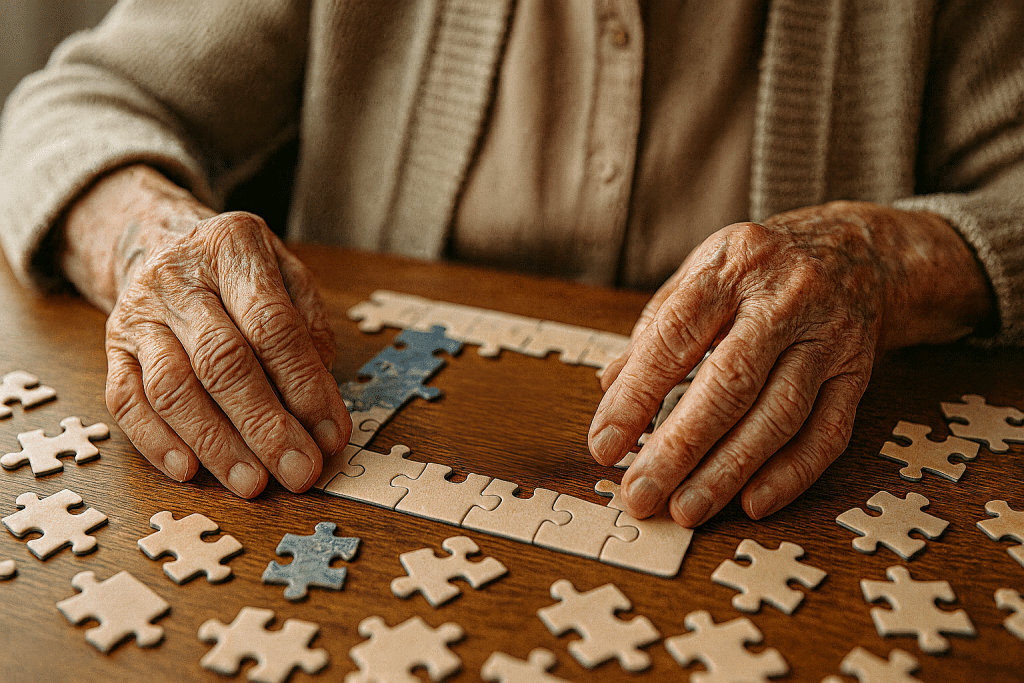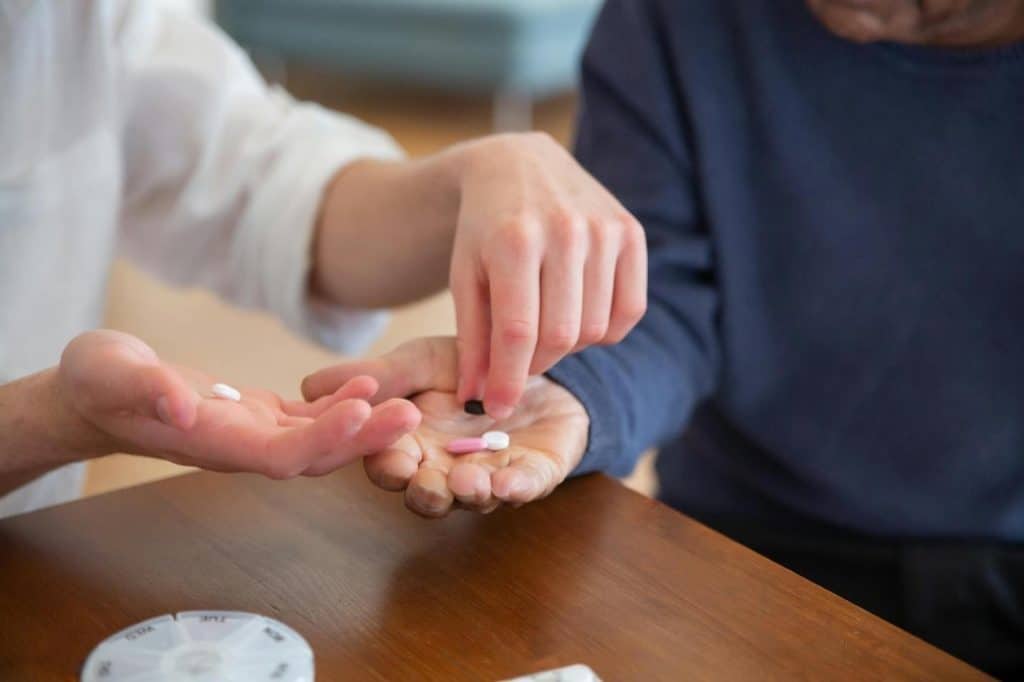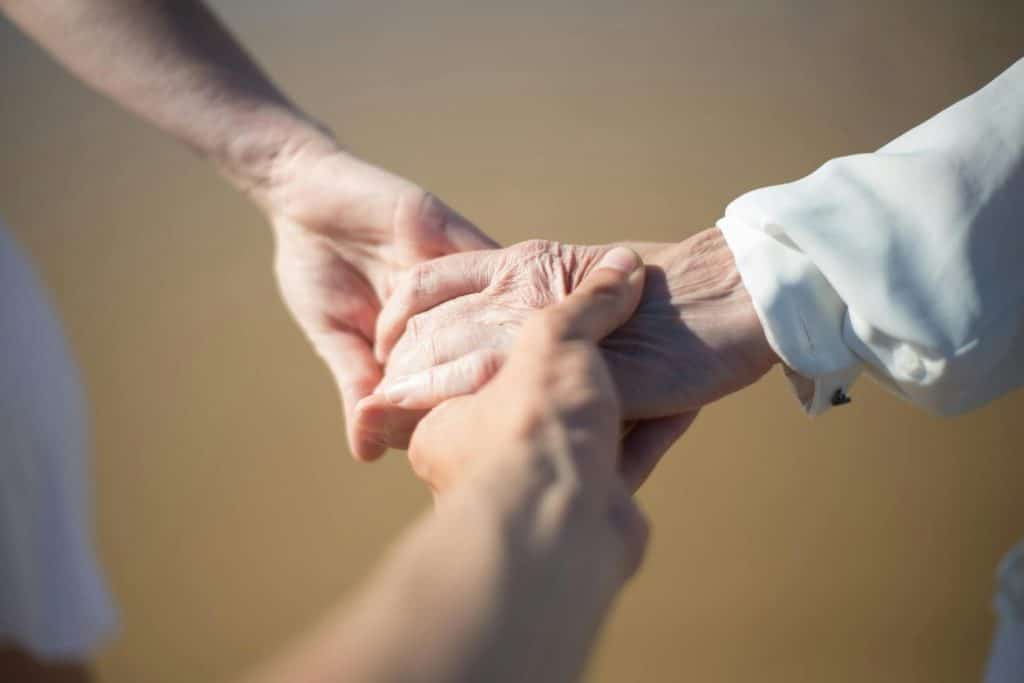Why is it essential to stimulate the mind in old age?
As the years go by, the body slows down, and the mind, if not stimulated, can follow suit.
However, getting older doesn’t have to mean losing cognitive abilities. Quite the opposite: with the right stimuli, you can keep your thinking sharp, your memory active and your taste for knowledge alive.
Cognitive stimulation for the elderly thus helps to preserve the most precious things we have: our identity, our stories and our autonomy.
Small gestures, such as solving a puzzle, listening to music, talking about the past or learning something new, can have a profound impact on an older person’s self-esteem, motivation and mental health.
At Hands Care, we believe that caring is also stimulating, that the comfort of home can (and should) be the stage for moments of discovery, curiosity and emotional connection.
In short, stimulating the mind is more than a practice – it’s an act of respect for life in all its stages.
Main cognitive challenges of ageing
With advancing age, the mind can begin to face some natural challenges. Among the most common are:
- Changes in short-term memory (greater difficulty in retaining new information);
- Decreased ability to sustain attention for long periods and to perform several tasks simultaneously;
- Slower thinking and solving everyday problems;
- Reduced verbal fluency or difficulty finding the right words;
- Weakness in so-called executive functions, such as planning, organization and the ability to inhibit impulsive responses.
These declines are not inevitable, but become more frequent with age.
By adopting a preventive and consistent approach, through personalized cognitive stimulation at home, for example, it is possible to mitigate many of these effects and promote active ageing, keeping the brain in constant activity every day.
Memory games and activities to do at home
In order to integrate cognitive stimulation in a way that is light, effective and adapted to the routine, it’s worth investing in activities for the elderly that make sense in their daily lives.
Here are some practical examples:
- Memory and association games: such as the classic memory game, where you have to form pairs of identical cards face down, or other visual challenges that involve remembering where each figure was;
- Crosswords, sudoku and word searches: they stimulate thinking and can be adjusted to different levels of difficulty;
- Visual puzzles: great for training visual perception, attention and spatial thinking;
- Logical sequences and simple thinking challenges: sorting objects or continuing numerical and visual patterns;
- List recall exercises: remembering and repeating the names of fruit, household items or cities, with slight variations;
- Sensory activities: identifying smells, touching different textures or observing visual stimuli carefully.
These memory games and exercises for the elderly involve different brain areas and can be easily integrated into the home routine.
With the support of a caregiver or family member, it is possible to hold short sessions of between 10 and 20 minutes, adjusting the difficulty according to the abilities and progress of each elderly person.
The most important thing is to ensure that the activity is engaging, challenging and, above all, enjoyable.
The importance of reading and continuous learning
Reading and writing are powerful tools for cognitive stimulation, with a direct impact on memory, attention and even self-esteem.
Reading a book, a newspaper or a poem activates memory, vocabulary, imagination and attention. Writing short notes, life stories or letters stimulates executive functions, fine motor skills and the ability to remember.
But just as important as reading and writing is cultivating continuous learning, whether through new subjects, new stories or even new technologies. The act of learning, even in small doses, keeps the brain moving and helps to strengthen confidence and autonomy.
Here are some simple but effective suggestions:
- Read aloud and comment on the text together;
- Make short summaries of the chapters read;
- Write about personal memories or events of the day;
- Keep a diary or even a blog with the support of family members;
- Exchanging correspondence with friends and family, whether on paper or digitally.
These practices help prevent dementia at home by strengthening neural connections and promoting reflective thinking.
More than a mental exercise, they are moments of pleasure, personal expression and connection with others, which is essential for emotional well-being in old age.
Music, art and creative expression in home care
Music, art and other forms of creative expression are much more than just hobbies: they are valuable stimuli for the mind and emotions, especially in old age.
In the context of personalized cognitive stimulation at home, integrating these activities can unlock memories, promote creativity and generate moments of real pleasure.
Here are some ideas that you can explore at home:
- Play simple instruments such as castanets or rattles, or simply accompany songs with clapping and movement;
- Listen to songs from the older person’s youth, sing along or try to guess the name of the song;
- Paint, draw, make collages or handicrafts with materials adapted to each person’s motor skills;
- Dance lightly or move to the rhythm of the music, even when sitting down;
- Explore theater or storytelling with visual support, such as puppets or illustrative images.
Research and practice show that these artistic expressions stimulate various areas of the brain linked to memory, emotion and creativity. They also increase motivation, reduce anxiety and strengthen the bond between the elderly person and their caregivers.
A caregiver with empathy and sensitivity to these areas can adapt the proposals to each person’s profile, making the process more engaging and meaningful. Because caring is also about creating and every day is a new opportunity to do so.
The role of the caregiver in cognitive stimulation
In the context of cognitive activities at home, the caregiver plays an extremely important role, not only as a companion, but also as a facilitator, motivator and close observer.
It is he who adapts, guides and gives continuity to the practices that keep the mind active, always respecting the rhythm and individuality of each elderly person.
His responsibilities include:
- Know the person you are accompanying well: their tastes, interests, limits and motivations;
- Make a simple initial assessment, identifying strengths and possible challenges;
- Plan, together with the family, social activities at home, promoting moments of conviviality and stimulation;
- Adjust the degree of difficulty of the tasks gradually and respectfully;
- Reinforce achievements with praise and encourage the elderly person’s active participation in planning activities;
- Keep an eye on progress and identify any signs of accelerated cognitive decline;
- Collaborate with specialized professionals, such as occupational therapists or neuropsychologists, whenever necessary.
In a professional service like Hands Care, caregivers receive ongoing training and close monitoring to ensure that each cognitive stimulation activity is carried out with quality, empathy and a focus on well-being.
How to keep your mind active with home support
Cognitive stimulation is most effective when it is consistent, adapted and integrated into the elderly person’s daily routine. Therefore, for it to have a real and lasting impact, it is important to adopt good practices that guarantee continuity, involvement and well-being.
Here are some key strategies:
- Personalized plans: each person is unique and therefore the stimulation plan must respect their abilities, preferences and state of health;
- Regularity above all else: short, frequent sessions are more effective than long, one-off activities;
- Activities integrated into everyday life: games, reading or music can be part of existing moments – after lunch, in the evening, or whenever it feels natural;
- Family presence and an active social life: conversations, visits, video calls or cultural sharing help to keep the mind awake and the heart full;
- Continuous evaluation and adaptation: it is essential to monitor progress and adjust activities whenever necessary;
- Overall stimulation, not just mental: cognitive well-being also depends on other areas, such as diet, gentle physical exercise and rest;
- Empathy in every gesture: more than fulfilling tasks, home support must ensure that the elderly person feels valued, safe and respected at all times.
At Hands Care, our commitment goes far beyond physical care.
We deeply believe that every mind deserves to be listened to, stimulated and cared for with attention. By combining our experience in home care with personalized cognitive stimulation strategies, we help transform the routine of the elderly into moments full of purpose and joy.
Conclusion
Stimulating the mind of an elderly person requires sensitivity, planning and continuity, but above all dedication and affection.
Through cognitive stimulation of the elderly in home support, combined with activities at home such as reading, art and socializing, it is possible to preserve lucidity, strengthen self-esteem and promote the joy of living.
As a home care company, Hands Care is by your side, with qualified caregivers and a service that values not only the body, but also the mind and dignity of each person. Because caring is also about stimulating and strengthening.
Would you like to know more about our services and caregivers? Contact us or schedule a technical visit using our



